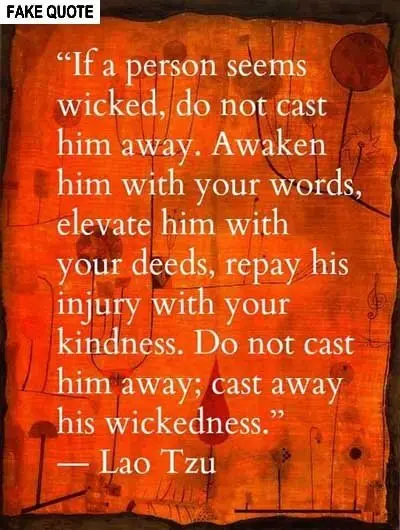Fake Lao Tzu Quote
"If a person seems wicked..."

This is NOT a quote from Tao Te Ching:
"If a person seems wicked,
do not cast him away.
Awaken him with your words,
elevate him with your deeds,
repay his injury with your kindness.
Do not cast him away;
cast away his wickedness."
The Book
The Taoism of Lao Tzu Explained. The great Taoist philosophy classic by Lao Tzu translated, and each of the 81 chapters extensively commented. Click the image to see the book at Amazon (paid link).
More about the book here.
|
I might be overly sensitive, but the word wicked strikes me as misplaced in the translation of a philosophical Chinese text from around 2,400 years ago. But the general message in this quote is something Lao Tzu would not deny. Those who are bad should not be condemned and abandoned — they should be converted.
He wrote in chapter 27 of Tao Te Ching that "the sage takes care of all people, forsaking none" and later in the chapter (my version):
So, a good person is the bad person's teacher.
A bad person is the good person's task.
The quote examined here seems like it could be an elaboration of these lines from chapter 27, but it is not. It originates in the book Change Your Thoughts, Change Your Life: Living the Wisdom of the Tao from 2007, by Wayne W. Dyer (page 294), where it is expressly stated in the header to be from chapter 62.
|
90 of the most spread false Lao Tzu quotes, why they are false and where they are really from. Book by Stefan Stenudd. Click the image to see the book at Amazon (paid link).
More about the book here.
|
That is confusing, since the chapter in question contains little similar to the quote. Here is the corresponding part of the chapter in my version:
Fine words are traded.
Noble deeds gain respect.
But people who are not good,
Why abandon them?
Bernhard Karlgren in 1975 wrote, for some reason omitting the question mark (page 11):
With fine words one can buy honours, with fine actions one can surpass others. The bad ones among men, why need they be rejected.
Now, in the preface to his book (page xv), Dyer gladly confessed to his dependence on Jonathan Star's Tao Te Ching: The Definitive Edition from 2001 for his versions of many Tao Te Ching chapters, also specifically chapter 62. He was not just being polite. The same part of chapter 62 reads almost exactly the same in Star's version (page 75). The only difference is that Star wrote "requite" instead of "repay."
Still, Star's version is just as far off from scholarly translations of the lines. It is strange in his case, because later in his book, he gives a word by word translation of the Chinese text, hardly supporting his own interpretation.
Jonathan Star's version of Tao Te Ching is also discussed in the chapter Hold your male side with your female side. For more about Wayne W. Dyer and his interpretations of Tao Te Ching, see the chapter Every human being's essential nature.
Stefan Stenudd
September 16, 2020.
There are many more fake Lao Tzu quotes examined on this website.
Click the header to see a list of them.
Click the header to read a "fake" interview with Stefan Stenudd, the author of
Fake Lao Tzu Quotes.
My Taoism Books
Click the image to see the book at Amazon (paid link).
The Taoism of Lao Tzu Explained. The great Taoist philosophy classic by Lao Tzu translated, and each of the 81 chapters extensively commented.
More about the book here.
The Ancient Wisdom of the Tao Te Ching by Lao Tzu. 389 quotes from the foremost Taoist classic, divided into 51 prominent topics. Click the image to see the book at Amazon (paid link).
More about the book here.
Erroneous Tao Te Ching Citations Examined. 90 of the most spread false Lao Tzu quotes, why they are false and where they are really from. Click the image to see the book at Amazon (paid link).
More about the book here.
|
My Other Websites:
The 64 hexagrams of the Chinese classic
I Ching and what they mean in divination. Try it online for free.
The ancient Chinese life energy
qi (
chi) explained, with simple instructions on how to exercise it.
The many ancient and modern life force beliefs all over the world explained and compared.
Other Books by Stefan Stenudd
Click the image to see the book at Amazon (paid link).
The Greek philosophers and what they thought about cosmology, myth, and the gods.
The life energy
qi (also
chi or
ki) explained, with exercises on how to awaken, increase and use it.
Basic concepts of the peaceful martial art. Aikido principles, philosophy, and fundamental ideas.
Qi, prana, spirit, ruach, pneuma, and many other life forces around the world explained and compared.
Jungian theories on myth and religion examined, from Carl G. Jung to Jordan B. Peterson.
About me
I'm a Swedish author and aikido instructor. In addition to fiction, I've written books about Taoism and other East Asian traditions. I'm also an historian of ideas, researching ancient thought and mythology. Click the image to get to my personal website.

 Tao Te Ching
Tao Te Ching Now it's a book, too!
Now it's a book, too! Tao Quotes
Tao Quotes Cosmos of the Ancients
Cosmos of the Ancients Qi — Increase Your Life Energy
Qi — Increase Your Life Energy Aikido Principles
Aikido Principles Life Energy Encyclopedia
Life Energy Encyclopedia Archetypes of Mythology
Archetypes of Mythology Stefan Stenudd
Stefan Stenudd